

















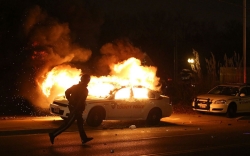
Protesters and police clash after a Missouri grand jury decides not to indict a white officer in a black teen’s death
A man who allegedly opened fire on police in Ferguson, Missouri, on the first anniversary of Michael Brown's death was critically wounded when the officers shot back, St. Louis County's Police Chief Jon Belmar said early Monday. The suspect, Tyrone Harris Jr., 18, was charged with 10 felony counts Monday afternoon.
Belmar said at a news conference that officers had been tracking the man, who they believed was armed, during a protest marking the death of Brown, an unarmed black teen who was shot by a white officer in 2014, sparking a wave of national protests against the mistreatment of African-Americans by police.
Belmar said the man approached four plainclothes officers on Sunday night who were in an unmarked police vehicle and opened fire. The officers returned fire from inside the vehicle. They then pursued the man on foot.
The chief said the man again fired on the officers, prompting all four to fire back. The alleged assailant was struck and fell.
The man was taken to a hospital, where, Belmar said, he was in "critical, unstable" condition.
Tyrone Harris identified the victim as his son, according to The St. Louis Post-Dispatch. The elder Harris said shortly after 3 a.m. that his son had just gotten out of surgery.
He said his son graduated from Normandy High School and that he and Brown "were real close."
The father called the police version of events "a bunch of lies." He said two girls who were with his son told him he was unarmed and was drawn into a dispute involving two groups of young people.
St. Louis County prosecutors on Monday announced 10 charges against Tyrone Harris Jr. — five counts of armed criminal action, four counts of first-degree assault on a law enforcement officer and a firearms charge. He is being held on a $250,000 cash bond.
Belmar said during the press conference, 2:30 a.m., that there is a "small group of people out there that are intent on making sure we don't have peace that prevails.”
"We can't sustain this as a community," he said, the Post-Dispatch reported.
Belmar said two groups of people exchanged gunfire on the west side of West Florissant Avenue at the same time the shooting took place. Forty to 50 shots rang out, he said. "It was a remarkable amount of gunfire," he added. The shots sent protesters and reporters running for cover.
The people doing the shooting "were criminals," he said. "They were not protesters."
The four detectives, who have six to 12 years of experience, will be placed on administrative leave, a standard practice after a police-involved shooting. They were not wearing body cameras, Belmar said.
The Ferguson Action Council, a coalition of protest groups formed after the death of Brown, released a statement on Monday condemning the use of plainclothes officers without body cameras and "overly aggressive policing" during Sunday's protests.
"After a year of protest and conversation around police accountability, having plainclothes officers without body cameras and proper identification in the protest setting leaves us with only the officers’ account of the incident, which is clearly problematic," Kayla Reed, a field organizer for Organization of Black Struggle, said in the statement.
St. Louis County Police said in a Monday morning media advisory that two teenage boys were also shot, at roughly 2:15 a.m. near the Michael Brown memorial in Ferguson. The two victims, both of whom survived, said an unidentified black man shot them from inside a vehicle, according to the police statement.
On Sunday crowds of white, black, old and young people gathered at the spot in Ferguson where Brown, 18, was fatally shot on Aug. 9, 2014.
After 4 1/2 minutes of silence to represent the roughly 4 1/2 hours that Brown's body was left in the middle of the street after he was shot, two white doves were released. The crowd then started a silent march to honor Brown and others who have died at the hands of police.
Organizers of Sunday's events said their aim was to keep alive a national movement fueled by the police killing of Brown and other unarmed black men in U.S. cities, including New York, Cincinnati, Baltimore and North Charleston, South Carolina.
At the memorial, Brown's father, Michael Brown Sr., wore a T-shirt bearing his son's image and the slogan "Chosen for change." Others held Black Lives Matter banners and signs calling for justice for those killed by police.
Pausing along the route at a permanent memorial for his son, Michael Brown Sr. said, "Miss you."
He thanked supporters before the march for not allowing what happened to his son to be "swept under the carpet."
St. Louis Alderman Antonio French, a prominent figure in the protest movement there, said before the program, “It’s an opportunity to see how far we have come in the last 365 days.” According to the Post-Dispatch, he noted that a large part of the crowd was white.
Later Sunday, a few hundred people turned out at Greater St. Mark Family Church in a ceremony to remember Brown, with his father joining other relatives sitting behind the pulpit.
After nightfall on Sunday, several hundred protesters blocked traffic. An officer said through a bullhorn they would be arrested if they did not move. Someone threw a glass bottle at officers but missed. Others cursed at officers.
For the first time in three nights of protests, some officers were dressed in riot gear, including bulletproof vests and helmets with shields.
The deaths of Brown and other African-American men in encounters with police sparked months of sometimes unruly protests in Ferguson and elsewhere around the United States. It strengthened the Black Lives Matter movement, which has cast a spotlight on long-troubled relations between police and minority residents of many U.S. cities.
The U.S. Justice Department and a St. Louis County grand jury declined to press charges against Darren Wilson, the officer who killed Brown. A separate Justice Department investigation of Ferguson's justice system found evidence of a profit-driven court system and widespread racial bias by police.
Al Jazeera and wire services
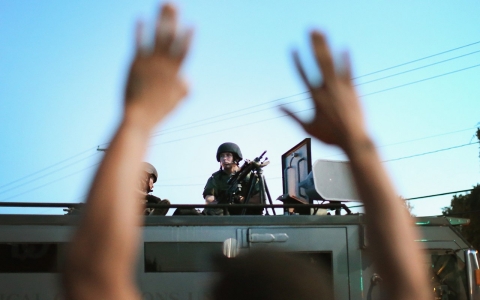
Overall satisfaction with how black people are treated in the United States has declined, says recent polling

Crisis-hit Ferguson looks back, on the anniversary of the killing, as tensions still simmer
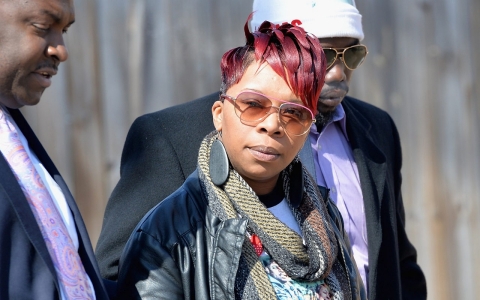
In exclusive TV interview, mother of teen killed by Ferguson officer tells Al Jazeera death was ‘cold and malicious’
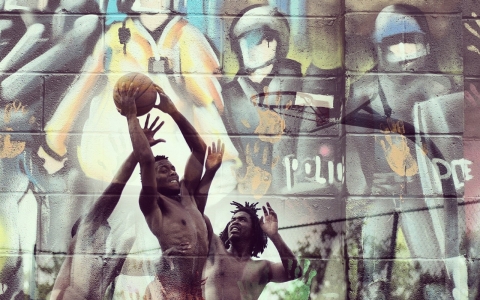
Now that the cameras have left Baltimore and Ferguson, we asked two photographers to document their cities
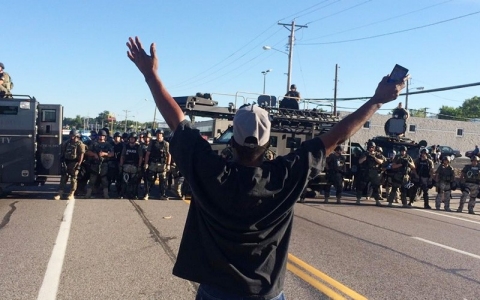
Fault Lines documents the reaction to the fatal shooting of an unarmed black teenager by a police officer
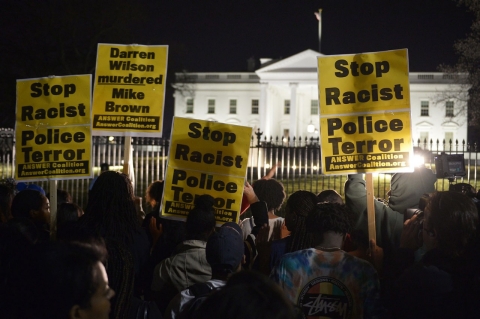
Opinion: Obama’s politics has difficulty addressing procedural abuses and the perversion of the rule of law






Error
Sorry, your comment was not saved due to a technical problem. Please try again later or using a different browser.